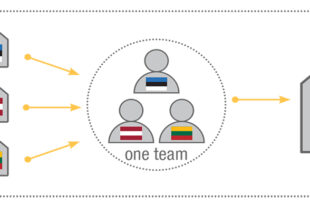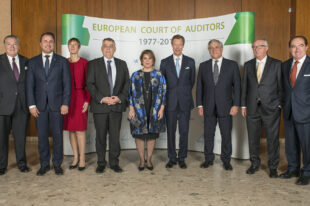Developing relevant and innovative approaches to support SAI Independence: Insights from the SAI Independence Rapid Advocacy Mechanism (SIRAM)
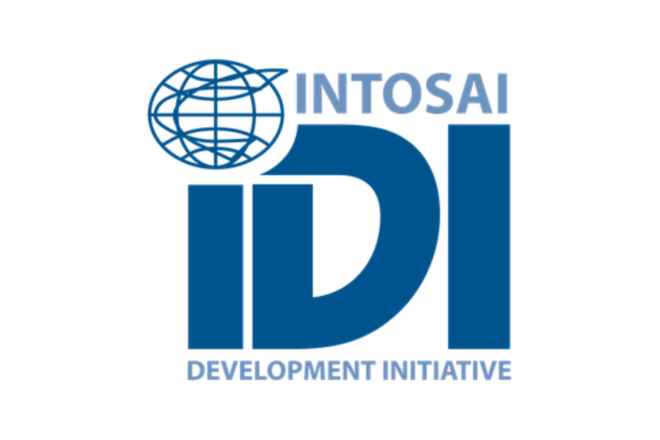
By Freddy Yves Ndjemba, Senior Manager, SAI Governance Department, INTOSAI Development Initiative
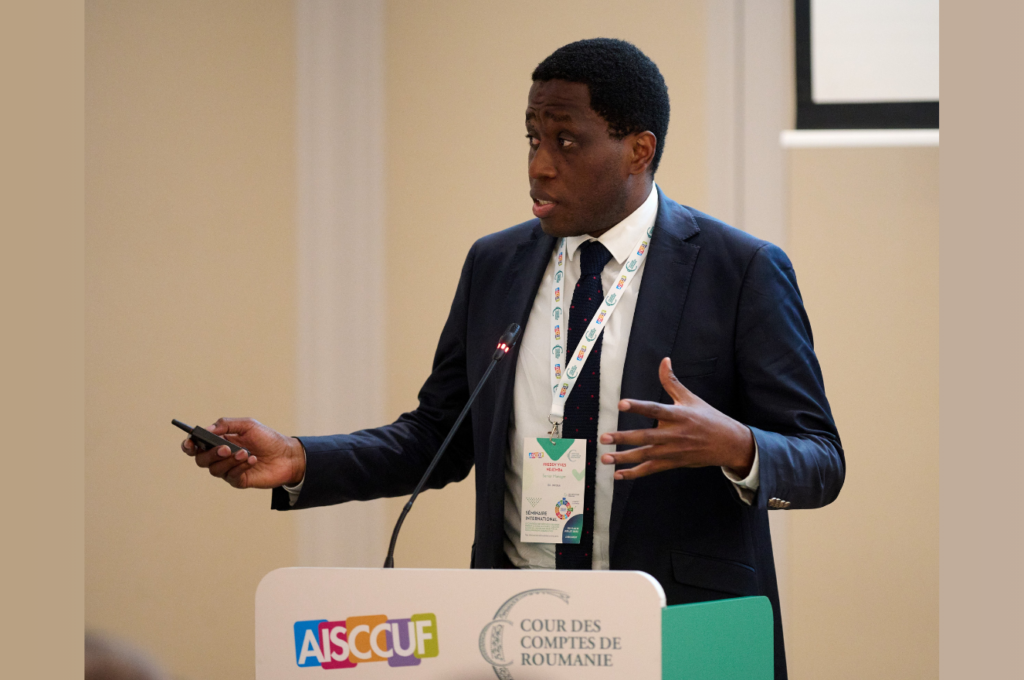
Supreme Audit Institutions (SAIs) have a vital role for public sector accountability, integrity, and transparency. To fulfill their role and build trust between the organs of the state and society, SAIs need to be independent.
SAI Independence may be understood as the ability of a Supreme Audit Institution to operate autonomously of the government, without undue influence and control. It is considered a fundamental condition for SAIs to effectively carry out their mandate. The INTOSAI Mexico Declaration on SAI Independence identifies eight conditions, known as the pillars of independence, as the benchmark against which the independence of an SAI can be assessed.
Data from the INTOSAI Development Initiative and the World Bank show that Supreme Audit Institutions (SAIs) around the world face increased threats to their independent operation and execution of audit mandates.
For instance, the last INTOSAI Global stocktaking report showed that at least 40% of SAIs experienced major interference in the execution of their budgets, and only 44% of SAIs said that they fully experienced timely, unconstrained, and free access to information for the proper discharge of their statutory responsibilities– a dramatic drop from the 70% who reported having full access in 2017.
Similarly, according to the most recent World Bank index on SAI Independence, most SAI budgets and financing were subject to approval by central government budgeting institution and only 22 countries out of 118 assessed, fully met the criteria on staffing autonomy.
INTOSAI through its Bodies, has always been very active in advocating and supporting SAI independence. These efforts have culminated with the adoption by INTOSAI of the Lima Declaration on Audit Principles in 1977 and the Mexico Declaration on SAI Independence in 2007, several instruments have recognized the importance of SAI Independence including three UN Resolutions and other high level political declarations.
Additionally, efforts to support SAI independence were driven by SAIs taking a leading role to advocate for greater independence through legislative changes. Over time, though, it has become clear that legislative changes are just one factor in a SAI’s independence. Political and institutional landscapes around the world are in a constant state of flux, and a variety of actions by the executive or legislative can threaten various aspects of SAI independence.
These threats can manifest in a variety of ways, such as through amendments to a country’s constitution, changes to the upcoming budget, alterations to the audit law, and attempts to remove the current Head(s) of the SAI or delay the appointment of a new Head. In a few cases, there have even been proposals to fully abolish the SAI as an independent institution.
The emergence of SIRAM
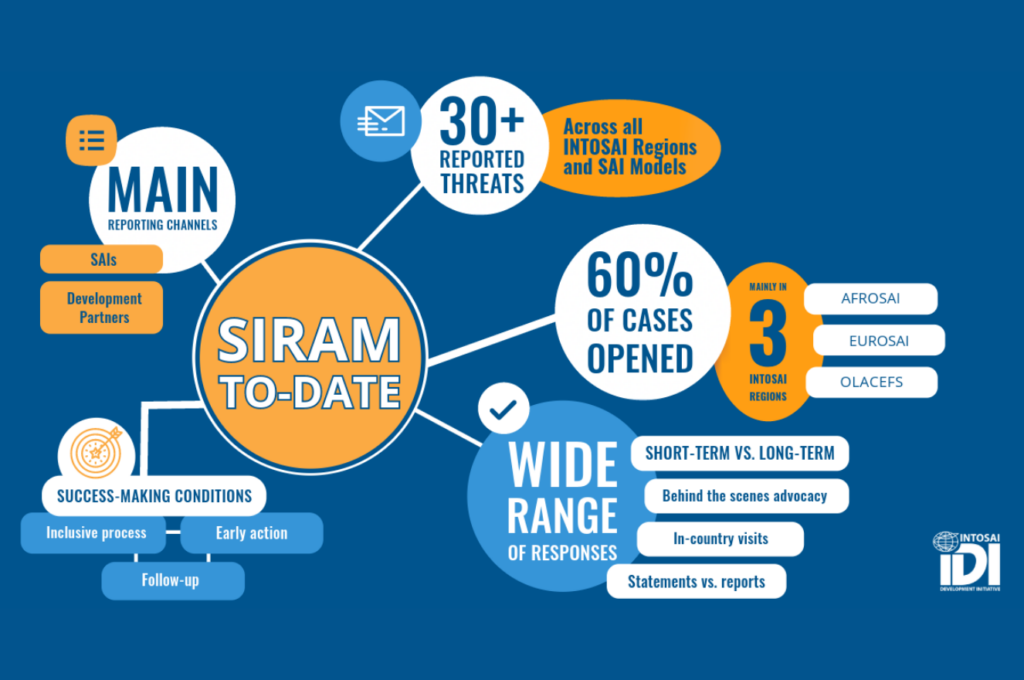
These ongoing risks highlight the need for the INTOSAI community and relevant stakeholders to develop tools and approaches which will help SAIs quickly and effectively respond to challenges to their independence.
It is against this backdrop that the SAI Independence Rapid advocacy Mechanism (SIRAM) was developed by IDI through the INTOSAI Donor Cooperation (IDC) to advocate and raise awareness to threats and breaches of SAI independence, as well as brokering support for SAIs facing challenges to their independence.
Over the years SIRAM has grown from a pilot initiative to a well-known and sought after mechanism. It has been mainstreamed within the INTOSAI and Donor Community and benefitted from tremendous support from various actors such as Civil Society Organizations and Academia, as the case process grew in complexity.
Reflecting on its implementation over the years several facts emerged, including:
- Although we are only seeing “a tip of the iceberg” as we are only capturing self-reported threats, the geographical dispersion of the cases indicates the globalized nature of the issue combined with a greater concentration in specific INTOSAI Regions.
- In areas of concentration, we see a correlation with threats affecting other independent institutions i.e., judiciary and the deterioration of the conditions around accountability i.e., shrinking of civic space.
- From a conceptual standpoint, threats to SAI Independence are generally from the perspective of Executive Interference, however, empirical evidence highlights additional drivers and angles from which SAI independence is threatened in practice.
- The growing complexity of the cases required a deeper understanding of the country context and the SAIs’ institutional set-up (legal framework and model), which could come at the expense of the rapidity of the response.
- Most threats evolve around specific INTOSAI principles, including security of tenure of the Auditor General, powers and mandate, timely and unrestricted access to information, as well as access to human resources and financial resources.
- Leveraging on donors’ influence, and outreach is critical in successfully advocating for SAI Independence. Similarly, effective advocacy at the country level requires expanding the breadth of stakeholders to consult with at the country level and even going beyond parliamentarians and CSOs to include politicians, media and institutional actors.
From Reactive to Proactive Advocacy
All these findings showed the relevance of the reactive approach through SIRAM, but they also point out to a more fundamental issue.
In fact, we saw a need to complement the ad hoc and reactive advocacy provided through SIRAM with a more proactive advocacy approach, which would support INTOSAI’s efforts by enabling a holistic and complete approach to Advocacy on SAI Independence.
It is in that context that we have positioned our efforts to proactively advocate for SAI Independence, including by developing relevant and innovative approaches to support SAI Independence. One example is through partnering with leading international organizations to create coalitions in support of SAI Independence.
The Masterclass on SAI Independence, organized jointly by IDI, OECD, and the French Cour des Comptes, positioned itself as an innovative approach where an eclectic constellation of SAI Heads, Development partners and thought leaders from Academica, came together to collectively brainstorm on SAI independence.
This resulted in a shared understanding of the challenges, and the identification of potential ways to strengthen SAI Independence. An additional by-product of this gathering is the launch of the joint IDI-OECD-IMF research project to support the development of OECD standards on SAI Independence.
Another example is the support provided to the Court of Accounts of Madagascar under the USAID funded TANTANA project, alongside the French Cour des Comptes and IMF.
Through effective advocacy and targeted technical support, we were able to support the SAI in changing its position in the budget structure by removing it from the Heading of the Ministry of Justice and giving the SAI its own heading in the budgetary framework.
The elevation of the SAI’s position in the state’s budget architecture provides the foundation for greater financial autonomy for the SAI, as it gives the Court of Accounts more leeway in planning for and managing its financial resources.
Finally, as strengthening SAI independence requires an all-hands-on deck approach, we will continuously work alongside stakeholders, and engage in relevant forums to mainstream and contextualize SAI Independence. To that end, we aim to work more closely with jurisdictional SAIs, including through the Forum of Jurisdictional SAIs, to partner and mainstream their approaches to SAI Independence.


